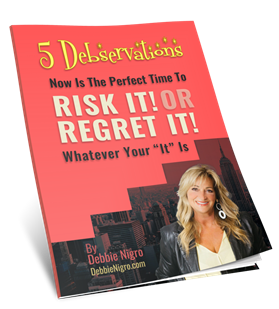I always try and bring some sunshine and some good energy and often I like to bring some good bagels.

Today if you use your ‘smellavision’ link ( only kidding there is none – yet lol ) it smells like fresh bagels!
I want you to meet Beth George, former attorney turned bagel whisperer and owner of Bagel-ish in Beacon, NY, and wow… this woman is rising dough and raising entrepreneurs.

Beth’s origin story is pure heart: in 2006 she started baking to help her son manage health and behavioral issues—researching the gut–brain connection long before it was trendy. That journey led her to develop healthier, more digestible bagels (tip: freeze, then toast—the “resistant starch” effect can lower the glycemic impact, and pairing with protein helps even more).

But Beth didn’t stop at a great bagel. Through Bagel-ish and her consulting/training work through her division called BYOB Bagels , she now teaches entrepreneurs how to open thriving bagel shops—in the U.S. and 12 countries (from Ethiopia to Sweden to Taiwan!). Clients range from one-store startups to multi-location operators. One early client even made it to Shark Tank and later exited big.

Want in on the bagel business?
- Startup ballpark: ~$450K on the lean end; many projects land $450K–$800K (retrofits can be closer to ~$200K).
- Revenue targets: to make the math work, plan for roughly $1.0M–$1.8M in annual sales and aim to keep about 25% by managing labor, food, and occupancy with discipline.
- Pro move: repurpose a former food location to save big on buildout.

Why her bagels stand out?
- Focus on healthier wheat formulas (tastier + more gut-friendly)
- Real-world training on formulas, equipment, SOPs, and projections
- A founder who blends legal rigor, R&D, and insane passion (her BYOB—Bake Your Own Bagels—shirt says it all: Passion Makes Perfect).
If you’re heading to the Hudson Valley, pop into Bagel-ish, 226 Main St, Beacon, NY.

If you’re dreaming of opening your own shop anywhere in the world , Beth’s training center and consulting might be your best first step.

Listen to my full conversation with Beth George on The Debbie Nigro Show and get inspired to turn that bagel dream into a blueprint.
If you’d rather read than listen the transcript of the audio is below.
Learn more: bagel-ish.com
AUDIO TRANSCRIPT:
And now, back to the Debbie Nigro Show.
0:00:27
(Speaker 2)
We get the sun every day. We bring our own good energy. That’s what we do here at the show. So I always love entrepreneurs who go for it, right? And you know, I’m a huge champion of both entrepreneurs and female entrepreneurs. And just, you know, I’m a fan of bagels.
0:00:42
(Speaker 2)
That ties this whole next story together. I’m going to introduce you to an incredibly interesting woman, Beth George, who I randomly met along the way. I used to call those things a random running. Do we still have that little?
0:00:55
(Speaker 10)
It’s a random running.
0:00:57
(Speaker 2)
We have the sound effect. Thanks, Bobby. Yeah, we have we have a woman joining us who’s going to just blow your mind about what she’s figured out how to do. Beth owns Bagel -ish. which is a really cool place we went to in Beacon, New York. Happened to stop in.
0:01:13
(Speaker 2)
My other half, Dave, had some business dealings with her. We decided to see if she was still there, and she was there that day, and we stopped in and had, like, incredible bagels she was feeding us. Like, try the rosemary bagel. Try this amazing, like, gluten -free salmon. I mean, there’s perfect salmon. I’m like, wow, this is really good stuff.
0:01:29
(Speaker 2)
So what Beth is doing, besides having a great bagel store and catering and everything, she has a consulting business. And this is the first I’ve heard of this. You know, I love First. She has this place, Bagelish and Beacon, that serves as a training center for bagel entrepreneurs who want to open their own unique bagel enterprises, focusing on healthier, tastier, and more gut -friendly bagels and menu items. She did a great job. Beth, welcome to the show.
0:01:56
(Speaker 1)
Thank you. Thank you.
0:01:58
(Speaker 3)
Hi.
0:01:58
(Speaker 2)
I know you’re busy.
0:02:00
(Speaker 1)
I’m just paying bills right now.
0:02:03
(Speaker 2)
Oh, I hate paying bills. I hate paying bills, Beth. Beth, your backstory. You were an attorney for 30 something years.
0:02:12
(Speaker 1)
I’m still licensed as an attorney, but I practiced law for a good 20 plus years.
0:02:16
(Speaker 2)
Oh, wow. And what were you doing in law? What was your focus?
0:02:21
(Speaker 1)
A range, because I was in, you know, small cities, so we could do a lot, but I was doing juvenile defense work, child advocacy work, some contracts work, some, you know, just trademark work, just a range. But at the time that I started doing bagels, I was doing mostly a little bit of criminal defense and juvenile advocacy.
0:02:42
(Speaker 2)
Oh, you’re a good woman. Thank you for doing that. Where did the bagel thing come in? Like, when did you get this bagel kick?
0:02:50
(Speaker 1)
So I made my first bagel in 2006. I can’t remember what month it was, but I do have that written down. At the time, so my son is now 28. I have a 33 -year -old daughter, 28 -year -old son and a 23 -year -old daughter. And at the time, he was eight years old. For the previous, you know, since he was about three, really suffering with some health and behavioral issues.
0:03:15
(Speaker 1)
And as a child advocate attorney, I’m seeing this with a lot of children. What is going on with kids these days? I had no idea. So I’m trying to think, you know, some days he’s so in great shape and other days he’s just losing it or not feeling well or whatever it was. So kind of fast forward three years, do a lot of research and connect the gut to the brain. 20 years ago.
0:03:37
(Speaker 2)
Wow you’re early on that because you know I started talking about this some years ago myself and I’m a firm believer that the gut and the brain is a direct connection.
0:03:47
(Speaker 1)
There is and there’s actually now lots of clinical studies showing that and actually research scientific. My son to me was my single singular clinical study. I tracked everything he ate, you know, what was going on around us and then what happened to him physically or his behaviors. And so we were really able to pinpoint triggering foods and chemicals.
0:04:11
(Speaker 2)
Got it, got it. So you made the bagel in a way that he could eat it and Is that how it was?
0:04:17
(Speaker 1)
I found out I mean, just to clarify, I’m not baking with spelt anymore. But I there’s this ancient grain called spelt. Sure. And it’s very expensive grain, very much like wheat, but it doesn’t have it’s much easier to digest, but it’s not gluten free. So I was baking with spelt. And I was doing some really nice things.
0:04:37
(Speaker 1)
And I looked at my son and I said, What is the one like bread product that you’re missing most in the world? If I could make you the best one ever, what would you want?
0:04:48
(Speaker 2)
And he said a bagel. Oh, what a sweet story this is. This is great.
0:04:51
(Speaker 1)
So I want to just interrupt you for a second, because did you say that he was diagnosed with autism, but it wasn’t? Well, he was diagnosed for being on the spectrum. You know, it was then they were calling it Asperger’s. Now they call it autistic spectrum disorders, ADHD, sensory integrative.
0:05:11
(Speaker 2)
He’s also incredibly intelligent, always has been.
0:05:14
(Speaker 1)
Got it.
0:05:15
(Speaker 2)
Yeah. OK, so go back to the bagel.
0:05:17
(Speaker 1)
So you make this bagel at your house. I make it at my house. So and just to give a backstory, so I’m of Middle Eastern descent, my husband’s of Eastern European Jewish descent. So, you know, we have this blended family. And I don’t know a thing about baking. So I say to him, I’m gonna figure it out.
0:05:42
(Speaker 1)
So I just start testing different recipes. Now I’ve always been, you know, cooking in the kitchen with my mother and my grandmother, doing some baking. but I really dug in deep with this. And as I started to just, I always researched.
0:05:55
(Speaker 2)
I’m a lawyer, so that’s how I was able to kind of figure out his issues.
0:05:58
(Speaker 1)
Great. And then I started researching, you know, bread making and bagel making.
0:06:03
(Speaker 5)
And I don’t know, after several tries and I gave him one finally and he gave me two thumbs up and I was like, oh, man, we’re onto something.
0:06:11
(Speaker 2)
Right, right. And look what you went on to. I mean, this is the origin of your story is very sweet and very important about, you know, trying to help the kids and then figuring out, you know, nutrition connection between behavior. And then now you have fast forward, you’re the bagel queen. You’re more than bagel -ish.
0:06:30
(Speaker 1)
You’re more than bagel -ish. So it just so happened, so I ended up creating, my husband and I created a factory, but I basically took it over because he had a full -time job. And we were selling these spelt bagels into Whole Foods and into Hannaford supermarkets. And we needed equipment, so I ended up contacting different equipment companies in the New York metro area. And I finally found this one place, Excalibur Bagel and Bakery Equipment. And I met their sales, main VP of sales, his name was Frank Morrow.
0:07:00
(Speaker 1)
And he has since passed away, which is very sad. And I think Dave knew him also, you know, through that whole, you know, equipment network in New York City. And so Frank encouraged me, convinced his boss that it’d be a great idea to have Spelt right outside of New York City. So I, you know, I shut down my factory in Maine, and I move it to this warehouse in Fairlawn, New Jersey with him. And we start doing spelt bagels and get other people involved. So the spelt thing goes on for about seven years, but it’s not really that profitable because it’s a very expensive product to make.
0:07:35
(Speaker 1)
We’re really careful with everything and getting into supermarkets is hard. You know, we were in a lot of them, but you’re not making money. Yeah. So, so I, like, okay, I got a phase out of this. What am I going to do next?
0:07:48
(Speaker 2)
So I went and got my law, you know, license in New York.
0:07:51
(Speaker 1)
He said, maybe I’ll practice law again. And I’m like, I’d rather make bagels. He’s like, it’s all in your head. It’s you’re, you’re brainy, like you could consult. I have put in literally thousands of bagel shops. He said, I will help you understand the bagel shop world.
0:08:11
(Speaker 1)
Again, that’s how I got into that network that Dave knows. Yeah. And then, and then I started building formulas and recipes and I had this like really rough place in a warehouse but had all the bagel equipment you need and I just started testing, testing, testing and then I started realizing that if we could make the wheat bagel healthier there would be a market for that because spelt was too expensive and it was confusing because it’s not gluten -free.
0:08:41
(Speaker 2)
So I’m like what if I just come out there with a gluten bagel that the world when they eat it will say wow what happened I don’t have a bellyache I feel better overall, like what’s going on? So I started designing healthier bagels. as best as they can be, you know. And they’re delicious, and they’re delicious. And I’ll tell you that I’m not the first person who acknowledged Beth in the media world. She’s been featured in the New York Times, CBS Sunday Morning, The Dish, ABC Localish, Bite Size Food 52, and the commercial, you know, baking world has recognized her, Milk Street Kitchen, and publications and podcasts.
0:09:19
(Speaker 2)
So I happen to pawn you, Beth, at BLM. B -Y -O -B bagels, which I see you wearing a cute t -shirt and one of your photos says passion makes perfect. And I know it came from passion. So I want to thank you for putting that effort in because I love, love your bagels. You told me that I should take them home and put them in the freezer. We bought some bagels after you
0:09:40
(Speaker 1)
treated us so generously. And then what happens when you freeze bagels and reheat them? Tell me, because that was exciting. So it’s called resistant starch, okay? So that’s any starch, but let’s just take my bagel because it tends to be a better bread, right? And it changes the molecular composition.
0:09:56
(Speaker 1)
I’m not a scientist, so I can’t really tell you everything. And when that molecular composition changes through the freezing process, It actually lowers the glycemic level of that starch and it’s easier to digest. So we digest it bypasses one of our intestines. I’m not sure if it’s the larger or the small. I can’t tell you that.
0:10:18
(Speaker 2)
Exactly. And then when you toast it, it even brings it down more. And if you pair it with a protein, so if people are testing themselves, they can make these tests where they’re like just eat it without toasting it, then toast it, then freeze it and toast it.
0:10:34
(Speaker 1)
and then freeze it, toast it, and pair it with a protein, and they should see differences.
0:11:04
(Speaker 2)
entrepreneurs in the country who want to open bagel shops.
0:11:07
(Speaker 1)
And you do the training right in Beacon? Because we’re, I want to make sure we get this all in. Outside the country too.
0:11:11
(Speaker 9)
Outside the country too.
0:11:13
(Speaker 6)
Yeah.
0:11:13
(Speaker 1)
So outside of the United States, we’re in 12 countries. As far as Ethiopia to Sweden to someone just opened up in Taiwan, Mexico, Canada, Indonesia. I mean, just amazing. Yeah. So we have that. And then in the States, we’re, we’re, we’re representing
0:11:35
(Speaker 2)
in about, you know, influencing in about 23 states.
0:11:39
(Speaker 8)
Now, there may be a one -off or there may be 10 stores in those states.
0:11:41
(Speaker 2)
It really depends. and they’re all individual entrepreneurs doing this.
0:11:48
(Speaker 1)
So this bagel business consulting company has been around since what, 2013? Yeah. And now you’re, you know, how many millionaires did you make? How many millions of dollars did you make for people teaching you how to make bagel shops? I’m in my tiny little apartment. Well, one of them, you know, Bantam Bagels, I taught them, they got into Shark Tank.
0:12:10
(Speaker 1)
We didn’t really know what they were up to. They were our first consulting client actually and I guess they sold for 34 million. But then we have others who are like expanding so they may own three company stores now with the property along with it and they start off with no experience at all. I mean it really depends on where you are and whether that kind of model is affordable and what their plan is. And then I do do these projection worksheets.
0:12:36
(Speaker 2)
We kind of What does a model look like? If you were to bring in X amount of dollars, how do you bring in that and how much can you spend on these different metrics?
0:12:46
(Speaker 1)
If you’re spending so much on on labor, then you’ve got to reduce what you’re spending on food or occupancy. There’s a method to this madness. Well, I love your method. Is there a number you can throw out, a basic startup number if somebody wants to start a bagel business?
0:13:06
(Speaker 2)
Yeah, it’s really shot up, unfortunately.
0:13:10
(Speaker 1)
So, I would say lowest, somebody lowest. Somebody can go, unless they already have a place that’s built, and they’re just, you know, scooping themselves right into it, is about 450 ,000.
0:13:22
(Speaker 2)
People are going up to 800 ,000.
0:13:24
(Speaker 1)
Wow, that’s a lot. Yeah, they have to bring in, you know, the ones that are spending that kind of money, they got to bring in in between a million and a million point eight and work on the metrics to keep about 25 % of that. Wow, that’s a lot of bagels.
0:13:39
(Speaker 7)
It is and it isn’t.
0:13:42
(Speaker 1)
I mean, when you see the multipliers and how it works, It does work.
0:13:48
(Speaker 2)
But it’s like, if you could, I mean, quick free advice out there, if you can find a place that maybe wasn’t a bagel shop, but with some other food places still in good shape, you have a lot of that infrastructure already built in, and you retrofit around that. And so I’ve had clients spent only $200 ,000, you know, yes, because, because they were able to do that retrofit, but it really depends. That’s all. If it’s from scratch, it’s going to be not cheap. I knew you weren’t dull. I’m so happy you stopped by, Beth George.
0:14:20
(Speaker 2)
Bagel -ish Extraordinary 226 Main Street over in Beacon, New York. And there’s a lot of people who head up to Beacon, New York in the fall.
0:14:27
(Speaker 1)
And then if you want to contact Beth, you want to go to her website, bagel -ish .
0:14:32
(Speaker 2)
com and all the information is there.
0:14:34
(Speaker 6)
And I’ll, of course, put this up on my social media so you can get in touch as well.
0:14:37
(Speaker 2)
Thank you so much, Beth. OK, thank you so much.
0:14:41
(Speaker 5)
We’ll have more time to talk.
0:14:42
(Speaker 4)
Appreciate you.
0:14:43
(Speaker 2)
Thank you.
0:14:44
(Speaker 3)
Have a great day.
0:14:45
(Speaker 2)
Bye bye. Bye. She likes to talk like me. That’s good. All right. More to come on the Debbie Nigro Show next.


